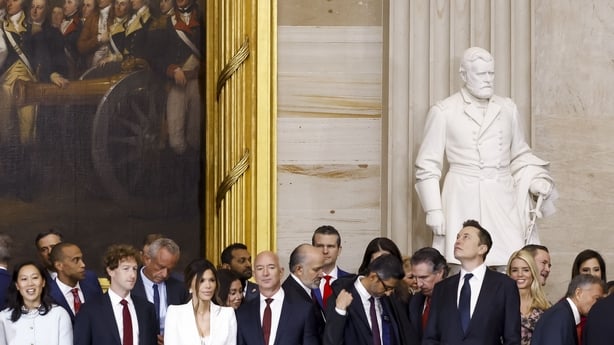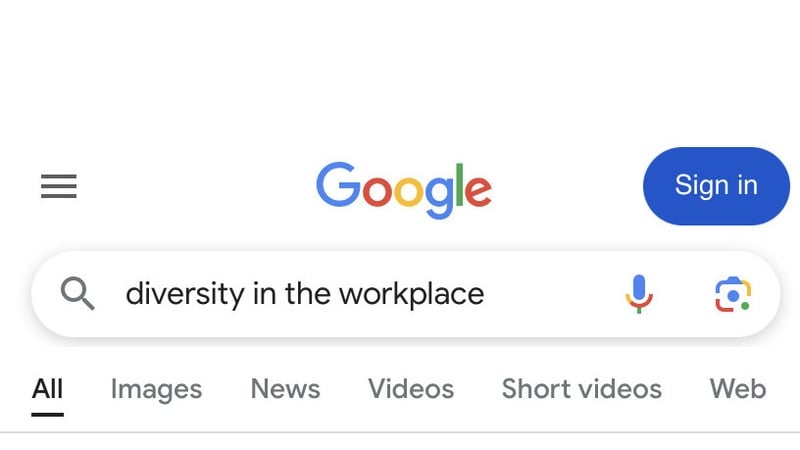“Workplace equality, diversity and inclusion is about valuing every employee as an individual.”
That’s the first reference that comes up when you google the words ‘diversity and inclusion’.
It’s from the CIPD website, the professional body for the HR industry in Ireland.
If you do the same google search under news, Google itself is making headlines.
Google scraps diversity-based hiring targets – RTÉ
Google joins US firms abandoning diversity recruitment goals – BBC
Google unwinds diversity goals, citing Trump’s DEI orders – The New York Times
It emerged this week that the tech giant is scrapping its goal to hire more employees from historically underrepresented groups and is reviewing some of its DEI initiatives.
DEI stands for diversity, equity and inclusion. In the US, DEI schemes are designed to make people of all backgrounds – regardless of ethnicity, class, sexuality and gender – feel supported and included in the workplace.
Here, the Irish Centre for Diversity works with organisation of all sizes and from all sectors, that share its vision of transforming workplaces to places that “value and benefit from the richness of FREDIE – Fairness, Respect, Equality, Diversity, Inclusion and Engagement”.
It’s CEO, Solat Chaudhry, said moving away from inclusion is “like moving away from healthy food”.
He appealed to companies considering moving away from diversity polices; “Don’t do it”.
“If you do , you will only have to come back when your employees run away to your competitors, when the bullies become empowered, when harassment goes up, when favouritism gets out of control, when sickness rates go up and when disciplinaries and grievances shoot up,” Mr Chaudhry said.
Google didn’t announce the decision this week, it was first reported by The Wall Street Journal whose journalists noticed an omission in its parent Alphabet’s annual filing with the US Securities and Exchange Commission.
The omitted line, which appeared in the previous three reports; “committed to making diversity, equity and inclusion part of everything we do and to growing a workforce that is representative of the users we serve”.
The company issued a statement saying: “We’re committed to creating a workplace where all our employees can succeed and have equal opportunities, and over the last year we’ve been reviewing our programs designed to help us get there. We’ve updated our 10-k language to reflect this, and as a federal contractor, our teams are also evaluating changes required following recent court decisions and executive orders on this topic.”
Google had for years been among the most vocal companies pushing for more inclusive policies.
In 2020, CEO Sundar Pichai set a goal to have 30% more of its leaders from underrepresented groups by 2025. At the time, about 96% of Google’s US leaders were white or Asian, and 73% globally were men.
Google, however, is not alone in making what many regard as a retrograde step.
Facebook parent Meta Platforms said in an internal memo it was ending its DEI programs, while Amazon also said it was “winding down outdated programs and materials” related to representation and inclusion.

The founders and CEOs of all these tech companies attended the inauguration of US President Donald Trump last month.
President Trump himself has basely blamed DEI hires for the Washington DC plane crash on January 29, and he has attributed DEI programmes as an impediment to the response efforts for the wildfires in Los Angeles.
In Ireland, businesses have embraced and embedded diversity polices, not just as an act of compliance, but because it has been established that they lead to better decisions and innovation.
Mary Connaughton, Director of CIPD Ireland, said diversity and inclusion are critically important for many organisations, who “want to better reflect the customer and market base that they operate in, which is increasingly diverse due to Ireland’s population”.
It is a central tool for recruitment too.
“New entrants to the workforce such as graduates have high expectations and regularly ask at interview about their prospective employer’s policy,” Ms Connaughton said. “They expect to find it embedded in the workplace, and are wary of any organisation they feel might simply be paying the issue lip service.”
Diversity and inclusion in Ireland is a necessity, because there are simply not enough Irish people to fill key roles in the workforce here.
Just this week, figures from the Central Statistics Office showed the country’s unemployment rate fell to 4% in January.
Skills shortages are regularly cited as a top concern in surveys of business leaders here.
“Last year the labour force grew significantly, with many people joining from outside Ireland,” Ms Connaughton said. “The number of work permits increased by 24% to nearly 40,000, all from non-EEA countries, so diversity is key to meeting the demands of this growing labour force.”
Big tech organisations might cut some of their DEI initiatives in the US, but those based in Ireland still have to report under the Corporate Sustainability Reporting Directive. Other EU directives are also coming, so the environment and workplace culture that has been cultivated here, is unlikely to change.
In fact, Ireland celebrates diversity in the workplace.
Just last night (Friday), the Irish Centre for Diveristy hosted the National Diversity & Inclusion Awards in Dublin.
Winners were announced across 12 categories covering all aspects of Diverity & Inclusion in the workplace, from ‘advancing social inclusion’ to ‘allyship’ to ‘advancing race and ethnicity equality’.
The nominees for the company of the year were: A&L Goodbody, Glenveagh, Grant Thornton, PTSB, Royal College of Physicians Ireland and Workday.




